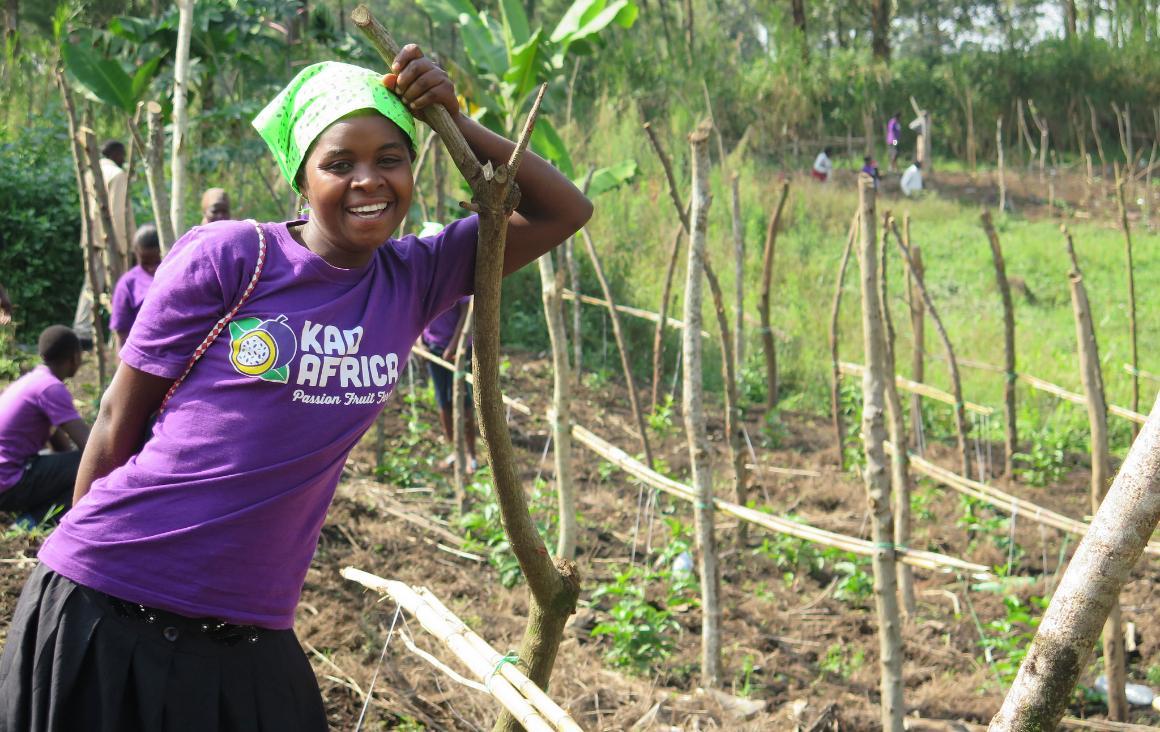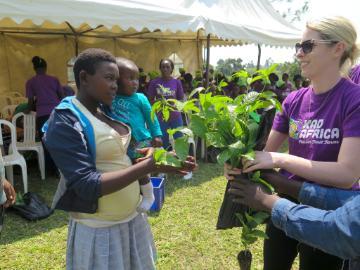
Fruit of the Vine
How Rebecca Kaduru ’09 turned farming passion fruit into a program to empower girls in Uganda
Some people become social entrepreneurs because they have a passion for eradicating poverty through a commercial business.
Rebecca (Mason) Kaduru ’09 became a social entrepreneur thanks to a different kind of passion—passion fruit.
Looking for a one-year program after her master’s work in Cairo was derailed by the 2011 revolution in Egypt, she quickly found one in Uganda. There, she met her future husband, Eric Kaduru, then an advertising professional in Kampala. In love and seeking new professional challenges, they decided to move to Fort Portal, a few hours west, where Eric had inherited some land. They would try their hand at farming.
“We planted tomatoes, onions, peppers,” she says. “Things grew pretty well. But we had a really, really, really hard time selling them.” The problem: Ugandan markets are controlled by produce resellers, known as traders, who know how to force farmers to take the lowest possible price in a very inefficient marketplace. “It was really hard,” she says.
The Kadurus, married in 2012, discovered that passion fruit was a high-demand product that traders hadn’t yet cornered. Normally imported from Kenya or Rwanda, passion fruit grows on a vine like tomatoes. But the plant is hardier and harvestable for more than a year before needing replanting. The fruit also doesn’t rot right away, making it feasible for the grower to travel to shop for the best prices.

In 2010, Rebecca Kaduru '09 (right) moved to Uganda where she met Eric and co-founded KADAfrica.
But when it came time to hire workers, the Kadurus encountered an interesting problem.
From their perspective, hiring women was often preferable to hiring men. Women -- including young girls who had dropped out of school and were often already married with children --proved less likely to take a few unexpected days or weeks off. But women didn’t want to be paid in cash. Why? Because most workable land in Uganda is owned by men, husbands felt entitled to their wives’ income.
In that moment, the Kadurus saw both a problem and an opportunity.
Women Are the Breadwinners
“We realized that women were the main agricultural breadwinners in Uganda,” says Rebecca. “We figured by removing girls from their household, they’d have more protection over what they earned … We kind of came up with the idea to start this program working with girls to boost our supply, but it also seemed like a natural fit based on work we’d been doing with these women at our farm.”
Partnering initially with a non-governmental organization, the Kadurus began a program to bring together groups of 30 girls at a time to work together, several times a week for a few hours at a time. They give the girls 60 seedlings each to plant and cultivate. Then, during the six months it takes seedlings to grow, they teach the girls life skills on everything from reproductive health and clean water to investment and saving strategies.
After that six-month “KadAfrica Experience,” the girls are expected to make the most of the fruit being grown on plots leased to KadAfrica by churches, the government, or others. They sell the harvested fruit back to KadAfrica and pool the proceeds in savings groups, for loans or reinvestment, to maximize their collective income.
“We have some girls that make a lot of money,” says Kaduru. “They can make over $100 a month, which is well above the average income for the area.”
There have been obstacles, of course. For example, at first some husbands were mistrustful of the unusual business endeavor for women. So KadAfrica started involving families in the process—giving families 10 seedlings of their own, and bringing them in for celebratory events throughout the training. “We could recognize that the families were a big stakeholder, and this was a way to address it,” Rebecca says.
The Value Chain
Now, she and Eric are back at Santa Clara University, where Rebecca graduated with a political science degree and found the first fellowship that took her abroad.
This time they are both attending Miller Center’s Global Social Benefit Institute Accelerator. The program chooses social enterprises that have great potential to break through to new levels of impact, or to a new geographic market, to provide market-based solutions to global poverty.
After months of online coaching and mentoring by some of Miller Center’s 150-plus volunteer mentors, each company like KadAfrica sends entrepreneurs to campus for 10 days of intense mentoring. It’s capped by a six-minute pitch in front of hundreds of potential funders or partners.
The 2017 cohort that includes the Kadurus brings together businesses from 14 different countries and regions—with Africa-based enterprises in Ghana, Kenya, Rwanda, Tanzania, Uganda, and Zambia, as well as companies based in India, Pakistan, Thailand, Colombia, Nicaragua, and Mexico. Seven of the attendees are women.
Rebecca Kaduru, who is doing all this while eight months pregnant with the couple’s first child, is optimistic about the program—and their future.
KadAfrica’s GSBI mentors are Lynne Anderson, a veteran environmental management consultant with LFAnderson, and Steve Albertolle, VP of finance for Matterport, a 3D/virtual-reality media technology company in Sunnyvale. They are helping the couple with their latest plan: leveraging USAID grant money to start processing the passion fruit into pulp. That will help insulate the company from future price drops, and it will generate more money to help more girls go through the KadAfrica Experience.
“We’ll almost have a full value chain,” says Kaduru.
The mentors have helped in other ways, too.
“We raised some investment capital in the last year, and have been having a lot of challenges adjusting from just being the two of us operating a company to working with a board of directors,” she says. “Our GSBI mentors have been really helpful with guidance on how to work with our board, to assert ourselves as the head of a company but also to make sure that their concerns are being addressed, we improve our reporting, and everyone's getting what they need.”
A full list of the 14 social enterprises attending is available at Miller Center.
A news release about the program is online.